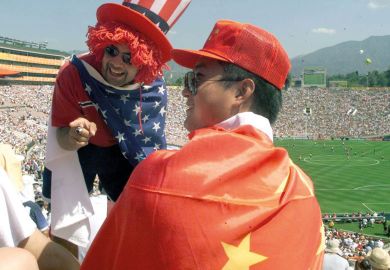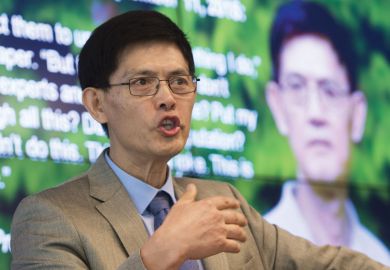Franklin Feng Tao, the associate professor of chemistry caught up in the Trump-era crackdown on research ties to his native China, is seeking his rehiring by the University of Kansas after getting his long-awaited federal court acquittal.
Dr Tao was convicted in a three-week trial in 2022 after being accused – in a manner similar to other cases in the Trump effort – of making an alleged omission on a paperwork form that hadn’t even been submitted to the federal government.
A federal appeals court has now reversed the remaining count from the case, saying the government failed to prove any fraud against it or the University of Kansas.
“Finally, after far too long, he has received some measure of justice,” an attorney for Dr Tao, Peter Zeidenberg, said of the appeals court decision. “This was a misguided prosecution from the very start.”
The China Initiative was created by the Trump administration out of an ostensible concern that China was using its substantial numbers of scientists and students in the US to illegally obtain valuable research secrets. Through it, the FBI opened thousands of investigations and brought dozens of indictments.
But barely any of the allegations suggested actual espionage, and cases were consistently abandoned or – in the few instances that went all the way to conviction – reversed. The end result has included a large-scale abandonment of the US by talented Chinese students and researchers, in what multiple experts see as a net scientific and economic loss for the US.
In the case of Dr Tao, federal investigators relied on information from a former colleague of the professor who had an authorship dispute with him and allegedly threatened to accuse him of being a spy if he did not pay her $300,000 (£230,000).
“This former student,” Mr Zeidenberg said of the accuser, “correctly believed that because of Dr Tao’s ethnicity, the FBI would overlook the obvious falsity of her accusations and launch a full-scale investigation into Dr Tao.”
Dr Tao was convicted on charges of wire fraud and making a false statement to the University of Kansas concerning his relationship with Fuzhou University. He was placed on administrative leave without pay at the time of his arrest in 2019. The University of Kansas then fired him after the conviction, but a federal judge dismissed the fraud convictions a few months later. The appeals court has now thrown out the false statement charge.
Dr Tao had faced a maximum prison sentence of 20 years on the charges for which he was convicted. He was sentenced only to a period of probation, which he already has served.
For the past five years, Dr Tao has continued to publish papers and write books, Mr Zeidenberg said. “He plans to seek to be reinstated at KU, or find employment at another university,” he said.
The University of Kansas has not responded to questions about the matter.
Register to continue
Why register?
- Registration is free and only takes a moment
- Once registered, you can read 3 articles a month
- Sign up for our newsletter
Subscribe
Or subscribe for unlimited access to:
- Unlimited access to news, views, insights & reviews
- Digital editions
- Digital access to THE’s university and college rankings analysis
Already registered or a current subscriber?








